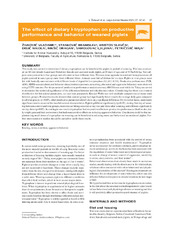Приказ основних података о документу
The effect of dietary l-tryptophan on productive performance and behavior of weaned piglets
| dc.creator | Vladimir, Živković | |
| dc.creator | Branislav, Stanković | |
| dc.creator | Slavča, Hristov | |
| dc.creator | Nikola, Delić | |
| dc.creator | Dragan, Nikšić | |
| dc.creator | Ljiljana, Samolovac | |
| dc.creator | Maja, Petričević | |
| dc.date.accessioned | 2022-12-06T15:22:27Z | |
| dc.date.available | 2022-12-06T15:22:27Z | |
| dc.date.issued | 2021 | |
| dc.identifier.issn | 1124-4593 | |
| dc.identifier.uri | http://aspace.agrif.bg.ac.rs/handle/123456789/6234 | |
| dc.description.abstract | This study was carried to determine if dietary tryptophan can be beneficial for piglets in period of weaning. Trial was conducted on 84 individuals (Landrace×Yorkshire) female and castrated male piglets, at 30 days of age, and of 9.78±0.42 kg. Test subjects were penned into four groups and allocated to four different diets. This was done opposite to standard farm procedure; all piglets penned in same group came from different litters. Animals were fed ad libitum for six days. Piglets in trial groups were fed with basically same mixture with different levels of digestible L-tryptophan (0.1; 0.2; 0.3%). Productive performance (FCR; ADG; ADFI) was calculated and behavior characteristics (postures, mounting, abnormal and aggressive behavior) were observed using CCTV cameras. For the purpose of production performance analysis one way ANOVA was used while the Tukey test served to determine the statistical significance of the differences between individual means values. Considering that there is no normal distribution for behavioral parameters, we used non parametric Kruskal-Wallis test with multiple comparisons of mean rank between groups. Productive results showed that control group had significantly better results for average daily gain compared to all trial groups (p<0.05), other productive parameters didn’t show any significant difference. On the other hand, statistically significant results occurred for two behavioral characteristics. Fighting differed significantly (p<0.05), during first day of weaning between control and trial groups, intensive ear biting occurred at day two and three after weaning, and different significantly on day three (p<0.05). According to our results tryptophan had no positive effects on productive performance (feed intake, daily weight gain and feed conversion), but had some positive effects on reducing aggressive behavior. Conclusion could be that implementing small doses of tryptophan on weaning can be beneficial to reducing stress and behavioral anomalies of piglets. Further more extensive studies should be carried to verify these results. © 2021, Massimo Morgante. All rights reserved. | |
| dc.language | English | |
| dc.rights | openAccess | |
| dc.rights.uri | https://creativecommons.org/licenses/by-nc/4.0/ | |
| dc.source | Large Animal Review | |
| dc.source | Large Animal Review | |
| dc.subject | aggressive behavior | |
| dc.subject | nutrition | |
| dc.subject | Rearing | |
| dc.subject | stress | |
| dc.title | The effect of dietary l-tryptophan on productive performance and behavior of weaned piglets | |
| dc.type | article | en |
| dc.rights.license | BY-NC | |
| dc.citation.epage | 41 | |
| dc.citation.issue | 1 | |
| dc.citation.rank | M23 | |
| dc.citation.spage | 37 | |
| dc.citation.volume | 27 | |
| dc.identifier.fulltext | http://aspace.agrif.bg.ac.rs/bitstream/id/24221/The_effect_of_dietary_pub_2022.pdf | |
| dc.identifier.rcub | https://hdl.handle.net/21.15107/rcub_agrospace_6234 | |
| dc.type.version | publishedVersion |


